The new rat-pack: the Gen-Z team saving shearwaters and killing invasive species on a remote island in the Irish sea
Meet the twenty-somethings trading clubbing and pub quizzes for bird ringing and hard graft on the Calf of Man.

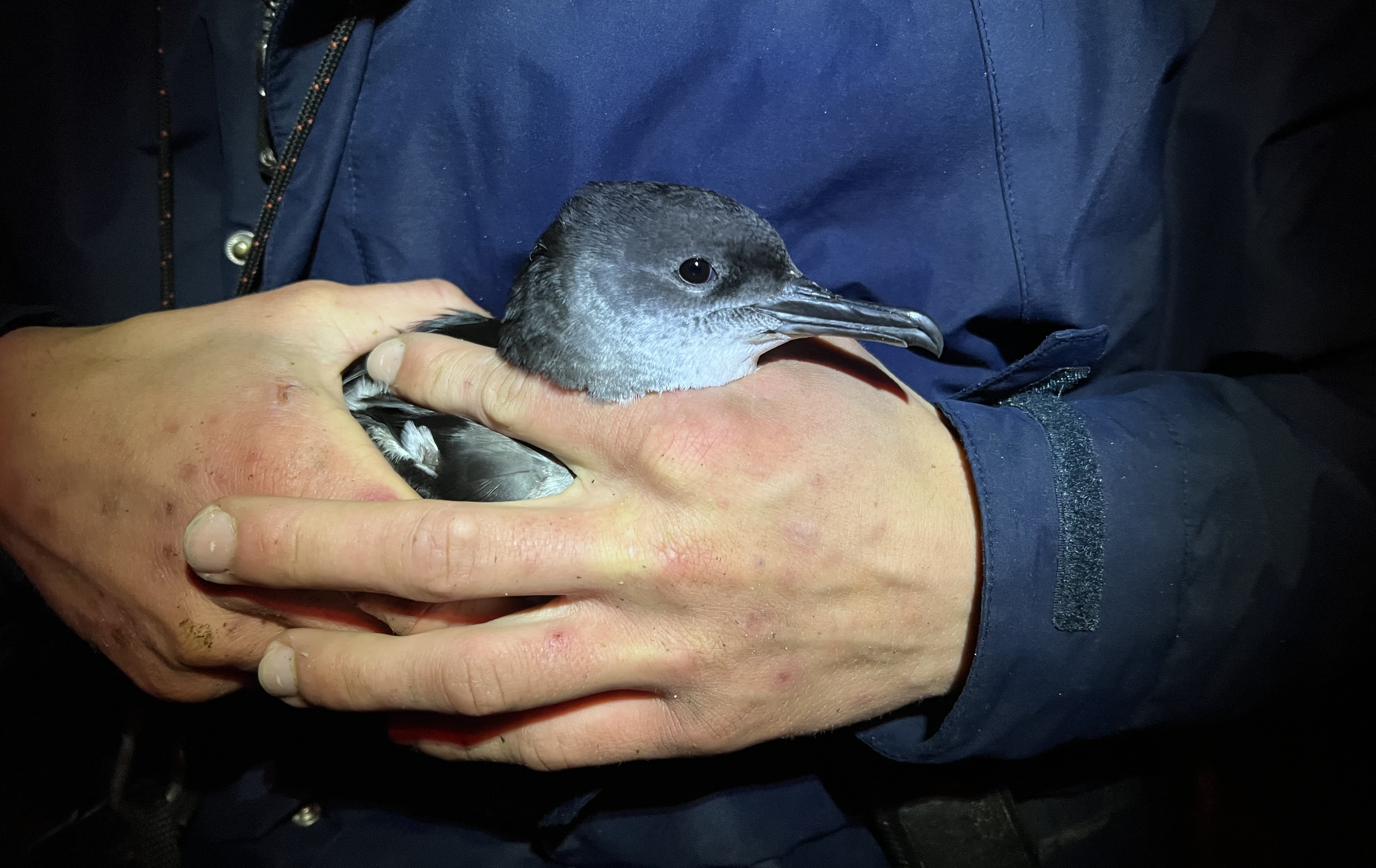
As we bounce over the waves towards the Calf of Man, nostrils full of diesel fumes from the engine of our rinky-dink boat, I have to clamp my mouth shut to avoid releasing a tsunami of vomit overboard. ‘I didn’t know if we’d be able to take her out today,’ roars Steve Clague, the captain, as I cling on to the side — and my stomach — for dear life. I had travelled to the Isle of Man to make this pilgrimage. I am visiting the Calf of Man, a remote island nearby, to find out what it’s like to live there.
The Calf of Man’s name derives from the Old Norse word kalfr, a term for a small island near a larger one. It has been a bird observatory since 1959 and is located off the main island’s southern tip. Its 600 acres used to be owned by the National Trust, but has been looked after by Manx National Heritage since 1986. They employ the Manx Wildlife Trust to care for it on a day-to-day basis and it is home to a large number of bird species and seasonal wardens. Many migrating species also visit (bird and human: the Calf has a small guest house).
The most important of these are Manx shearwaters, whose name refers to the many years this species has spent nesting on the Calf. Making sure the species continues to breed here is of vital importance to the Manx Wildlife Trust. Razorbills, kittiwakes and shags all regularly visit too and the wardens are endeavouring to encourage puffins to return in breeding season. Peregrines, choughs and hen harriers can also be spotted, as can many a seal and their pup. So can a film crew, from time to time. The calf has had a slight increase in media attention this year after it appeared on an episode of Guy Martin: Proper Jobs. I was told that he was very hands on and fixed their tractor (I got the impression that many on the island are still reeling from ‘the Guy effect’). The Calf is only accessible by boat, normally from one of two ports, Port St Mary or Port Erin.
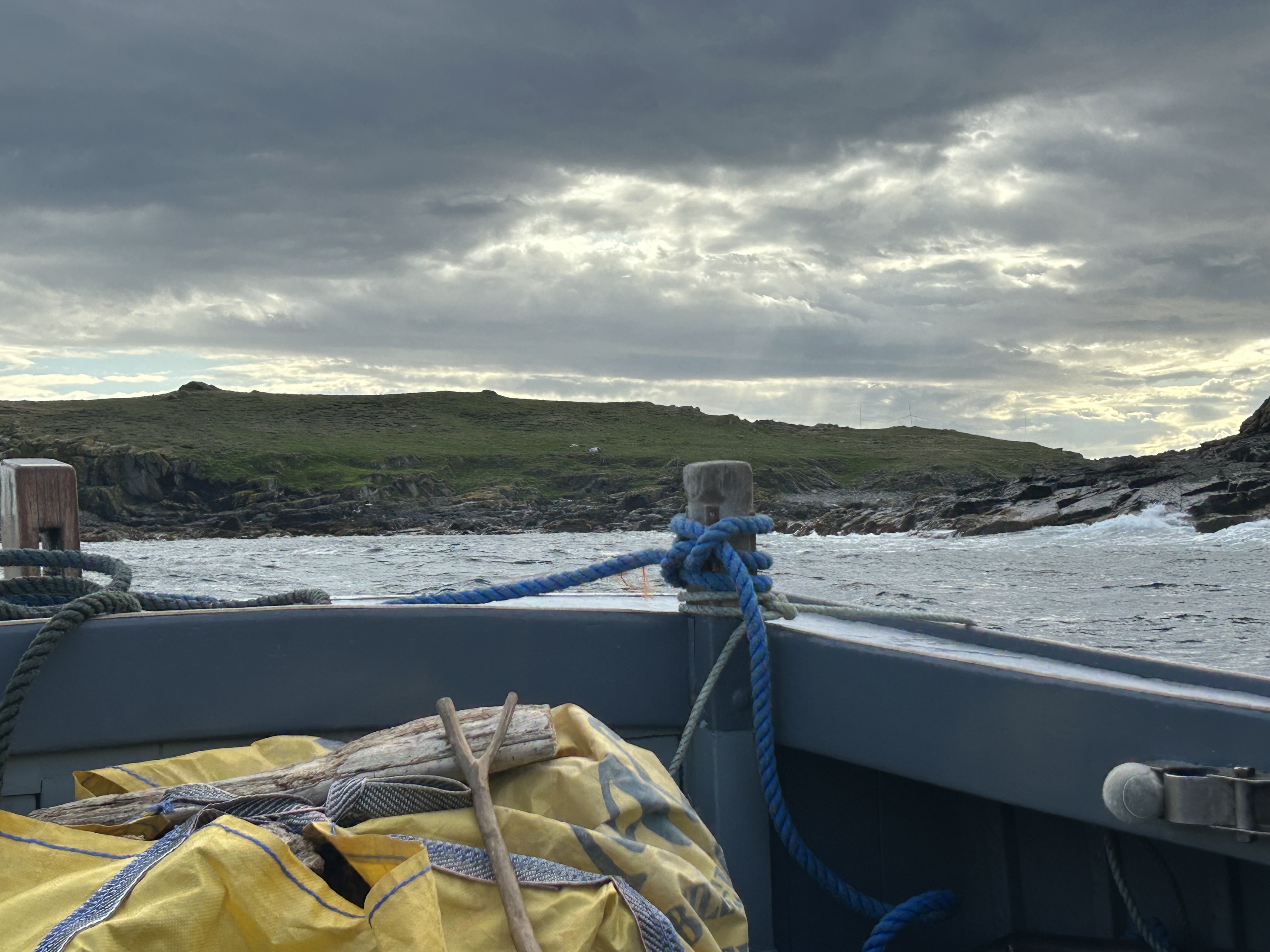
Views from the boat — if you can stomach the journey.
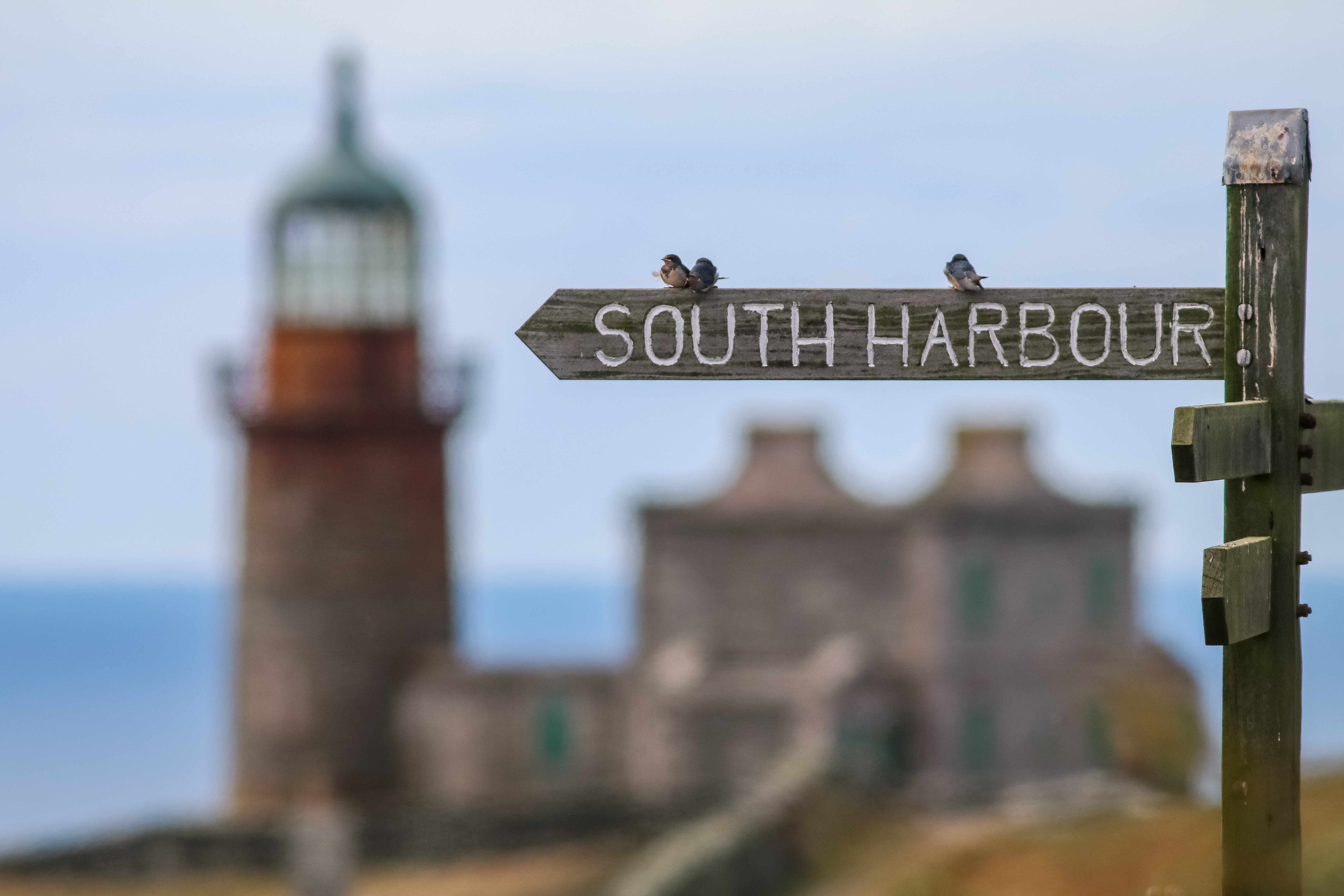
South Harbour, where boats arrive on the Calf of Man.
Kate Fox meets me at the dock. She made the crossing in March and will be on the island until October. At 25, she is the estate warden, the leader of the Gen Z army that manages the Calf. Her assistant Dominic Arkell is 26, as is her ornithological warden, Eleanor Grover. Eleanor has been here for four years, but the longest serving warden stayed for 11 years. The youth yearn for a simpler life.
It is Kate’s first season on the Calf and, despite a boyfriend on the mainland, she could be tempted to come back next year. ‘I haven’t decided yet,’ she says, as we trek past a sign that points us towards the island’s bird observatory, where she and the other wardens live. It is a gloriously sunny day and the island smells intoxicatingly of heather, which has painted its fields a deep purple. Kate says she’s pleased that I think it smells nice, as the wardens only get to shower once a week — sometimes less when there has been no rain water. I assure her she smells lovely.
Her assistant Dominic is also accustomed to being dirty and in a long distance relationship (perhaps these two factors enable one another). ‘During May it didn’t rain once, it was quite rough,’ he says. ‘But if everyone’s stinky, nobody’s stinky.’ Both have made sacrifices to work on the Calf, least of all body odour. ‘It’s not easy, but I’m very lucky,’ Kate says of maintaining her relationship. ‘We met on another island doing this sort of work, so my boyfriend fully understands it.’ Her last job was at Bardsey Island, off the coast of the Llŷn Peninsula in north Wales. ‘I loved the island life,’ she tells me. ‘When this role was advertised, it was the perfect job.’ Kate and Dominic both have a BA in Zoology, which is how they got into this line of work. Kate is paid living wage and Dominic is paid subsistence, so he is essentially a volunteer, but they have virtually no costs while on the island and accommodation is included in the role.
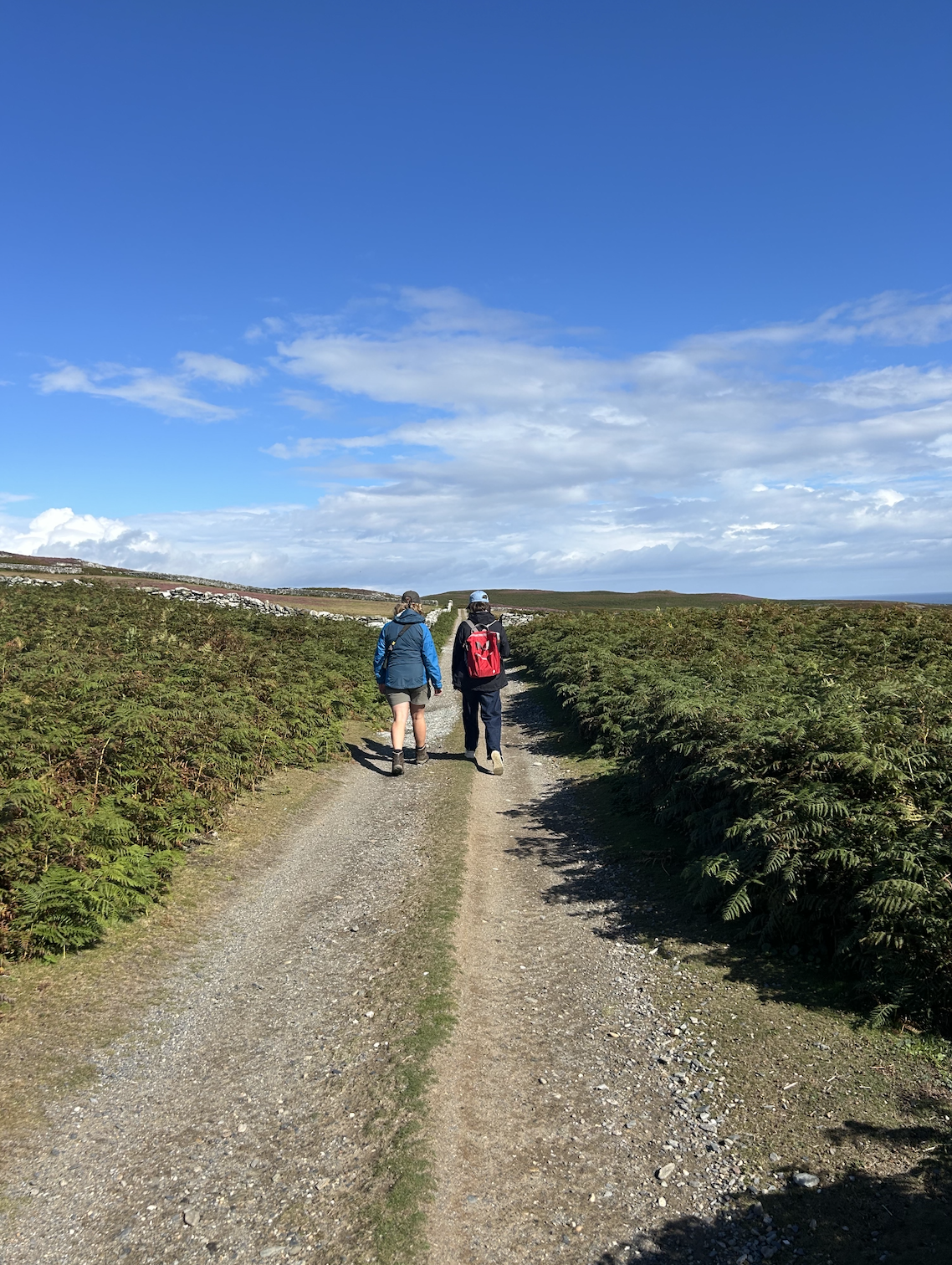
Kate giving me a tour of the island.
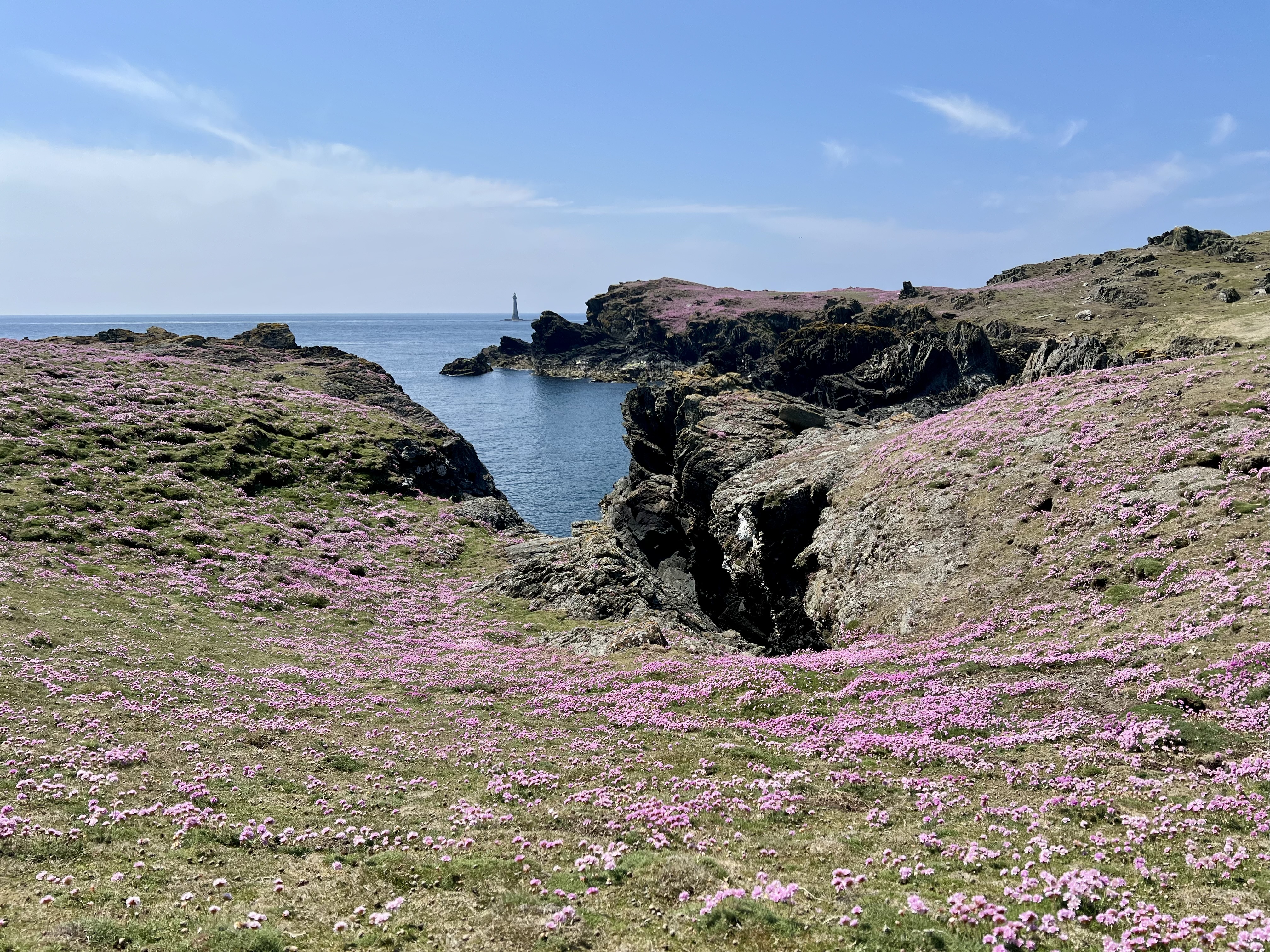
The Calf in full colour.
On a typical day Kate will get up at 7am, if the weather is behaving itself. The bird team wake far earlier, so Eleanor, as the island’s resident ornithological warden, will be long gone. The first order of the day is not a shower, but a protein-filled breakfast to stave off hunger throughout the day while working outdoors. ‘Dominic and I usually have breakfast together. Savoury porridge is my new thing,’ says Kate. I ask how this is made. ‘You make porridge and rather than putting sugar in it, you put a bit of garlic paste, salt, pepper, parsley, thyme, mushrooms, and then have it with some poached eggs.’ I gently suggest to Kate that she may have been away from society for too long.
Exquisite houses, the beauty of Nature, and how to get the most from your life, straight to your inbox.
For Kate, a day’s work can vary from riding around on the tractor, mending things on the island that have been damaged by storms, flailing the ever-growing bracken, shifting stone for the dry stone wallers who are repairing the island’s walls, preparing the guest quarters for any visitors that may be coming, and managing the resident Loaghtan sheep (a rare breed with four horns, native to the Isle of Man). The main task, however, is helping keep track of the visiting bird population.
Eleanor says: ‘We play a vital role in monitoring bird migration through a daily sensor. We record everything that we see, and use a scheme of bird ringing run by the British Trust of Ornithology (BTO), which involves putting a little tiny metal ring on the bird's leg so you can find out more about it.’ This year, much of warden’s efforts have revolved around encouraging puffins to breed on the island again. There have been 15-20 sightings of puffins this year. ‘There was one who fell in love with one of our decoy puffins, which we sat on the cliff tops last year, which was sweet — although quite sad,’ Dominic recalls. Much of this work is, naturally, weather dependent and wardens on the island work a 42-hour week, tending to take one day off.
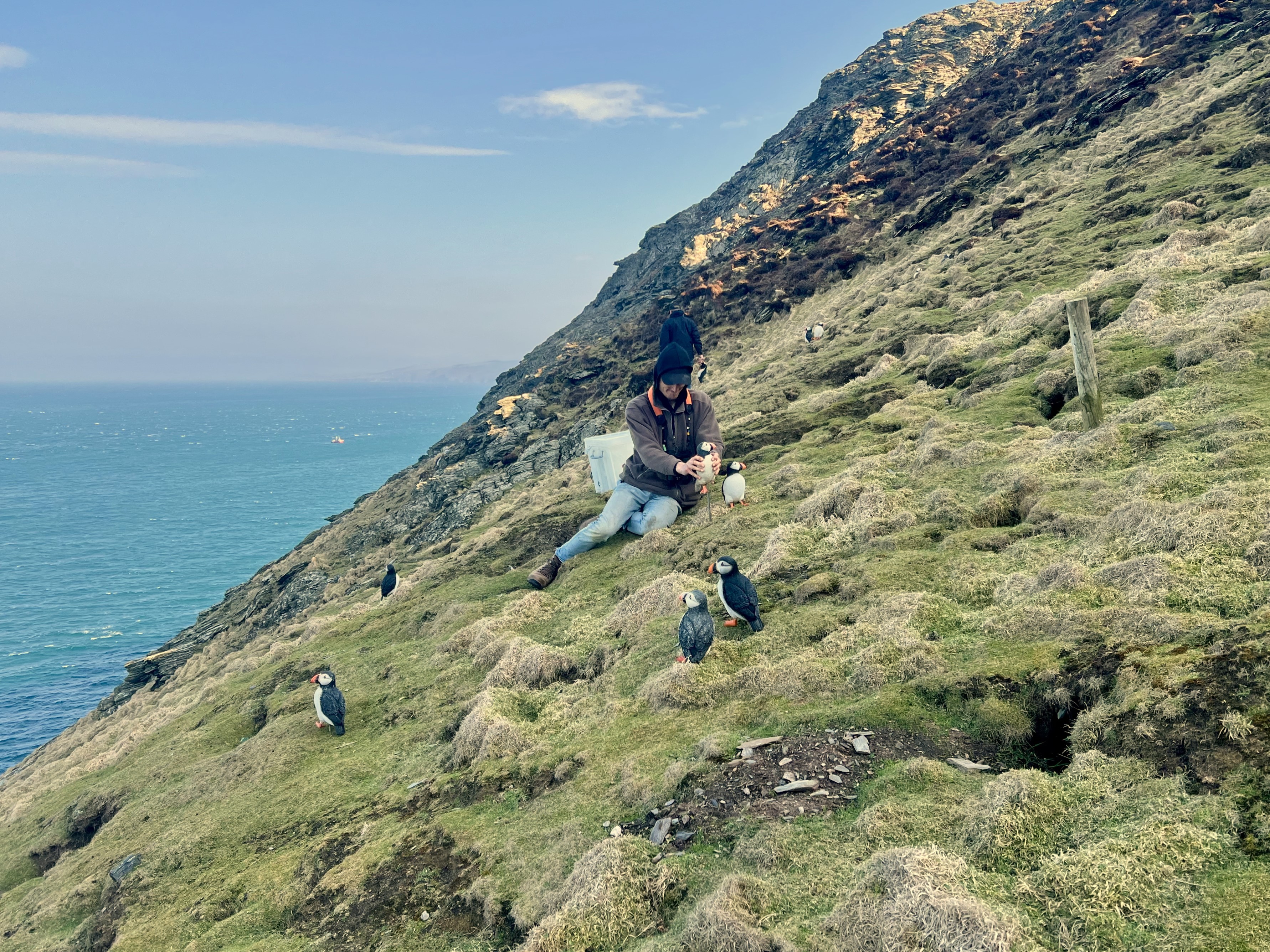
One of the wardens planting decoy puffins on the island.
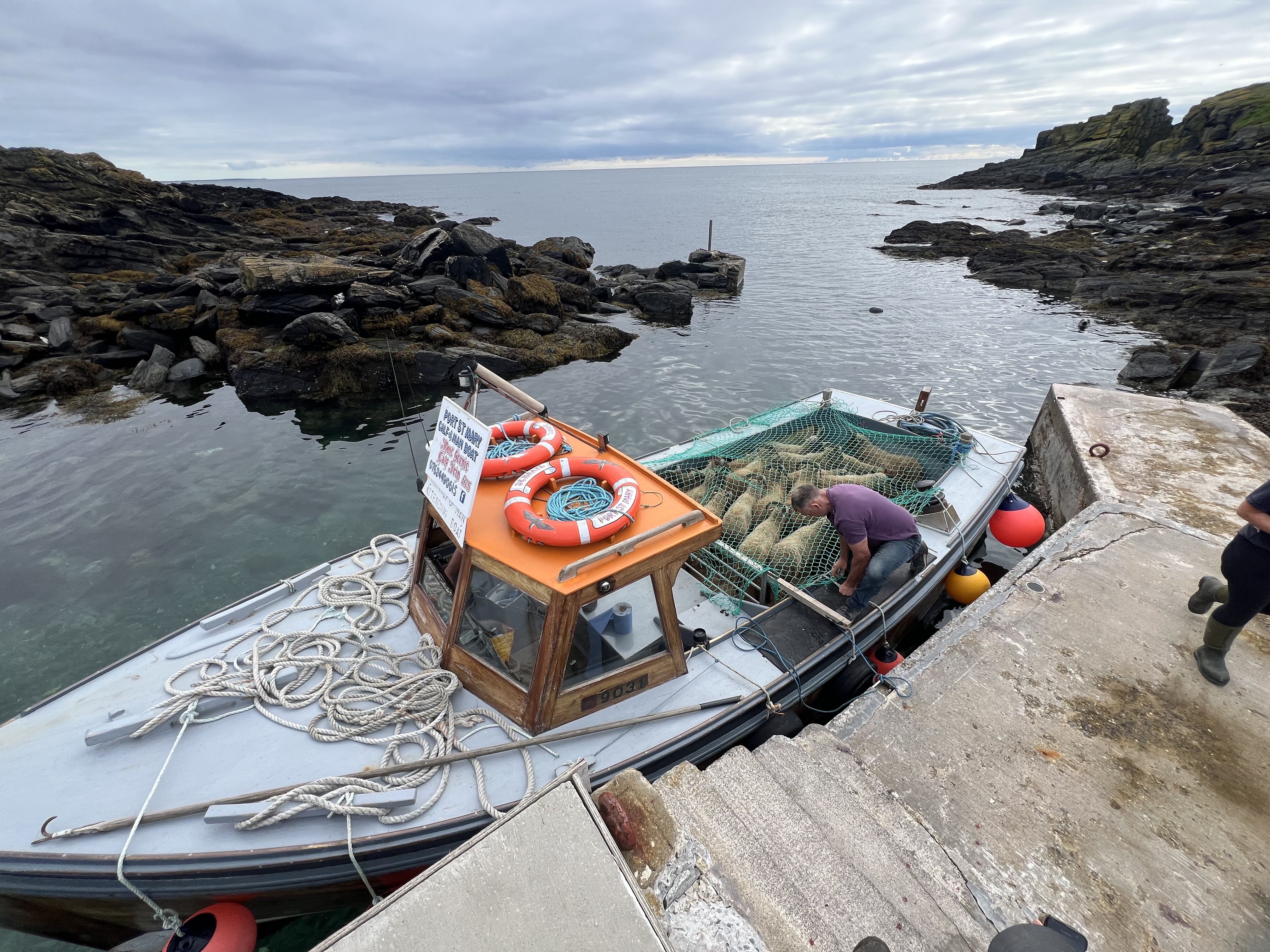
Eventually the wardens must return the Loaghtan sheep to the mainland. Hilariously, that looks a little something like this.
The observatory runs on rain water and a large diesel generator, which is kept in a farmhouse that was built in 1887. Hand-lit fires are the only source of central heating at the start of the season when it’s colder. The observatory has WiFi, but is the only place on the island that does, and the password is not given to visiting guests (except once when a visitor’s daughter was waiting on her GCSE results, but that was a rare exception). Chris, who runs the boat, brings over a weekly Tesco shop, but apart from that the wardens grow their own food and catch fish off the rocks. ‘We catch mostly Callig [the Manx word for Pollock],’ says Dominic.
Are they lonely? ‘When I was working remotely from home on the mainland I saw fewer people than I do here,’ Kate says. ‘Because we get guests coming on, and volunteers, but also because we are living with each other, we make an effort. We have chats in the evenings after we do our bird log.’
‘It can be lonely at times, but to do this job you’re not the type of person that wants to be around people all the time. I wouldn't say I'm a big city person. I very much enjoy my own company and enjoy being in the countryside.’ Dominic agrees: ‘We're incredibly lucky that we all get along so well. It feels less like stepping out of society than it does stepping into a very small one. And everyone that I see in a day matters to me, which is very nice.’ He adds: ‘Although the cravings do come now and then, the benefits of the lifestyle massively outweigh them.’
I ask if he thinks there is an innate quality one needs to live on the island. ‘I think it's just a willingness mindset that is required for this sort of thing. A lot of people might apply to the job expecting it to be a “I hate society” sort of thing, but it's not like that. You have to be a very sociable person, because everybody here matters.’ I ask him if his friends from home understand why he’s chosen this job. ‘They're all very happy for me, because they knew that it was what I needed and what I should be going into, but also perhaps they're a tad confused,’ he says. ‘But I think that confusion has turned, for the most part, to envy, because it is a wonderful way of life, and I think that a lot of my friends would love to live this way.’
A post shared by Calf of Man Bird Observatory (@calfofmanbirdobservatory)
A photo posted by on
‘The times that I make a plan, something will go wrong, so I've just learned to not make a plan'
Kate Fox, Estate Warden on the Calf of Man
There are downsides. The dreaded ‘long tails’. Like Macbeth, which must be referred to as ‘The Scottish Play’ while in a theatre, it is bad luck to say the word ‘rats’ while on the Calf, lest you summon then, Pied-Piper style. ‘One swam over quite recently and, as an invasive species, it's incredibly detrimental to the two bird colonies. I am still doing my best to catch him at the moment,’ Dom says, gesturing to the cameras and traps set up around the observatory. Rats are particularly detrimental to the burrows of the Manx Sheerwater, whose numbers are only just recovering from a fairly recent rat-infested boat wreckage off the coast which saw plenty swim over. ‘We've had three swim over this year, and it requires constant vigilance,’ Dom says.
Island life is, for the most part, about what the island decides the day will bring — whether that be long tails or something else. ‘The times that I make a plan, something will go wrong, so I've just learned to not make a plan,’ Kate says. ‘There are moments where you can feel a bit overwhelmed and like there's so much to do. But you then have a reset and think: “why am I here?” And you look around and it's stunning.’
‘The people that you work with are really good at picking each other up as well. You just become a little family, and you get so used to each other's moods and emotions that if one of us is having a low day, someone will ask me: “You okay?” Whereas, like a lot of people back on the mainland, you could be having a really bad day at work and no one will even notice.’
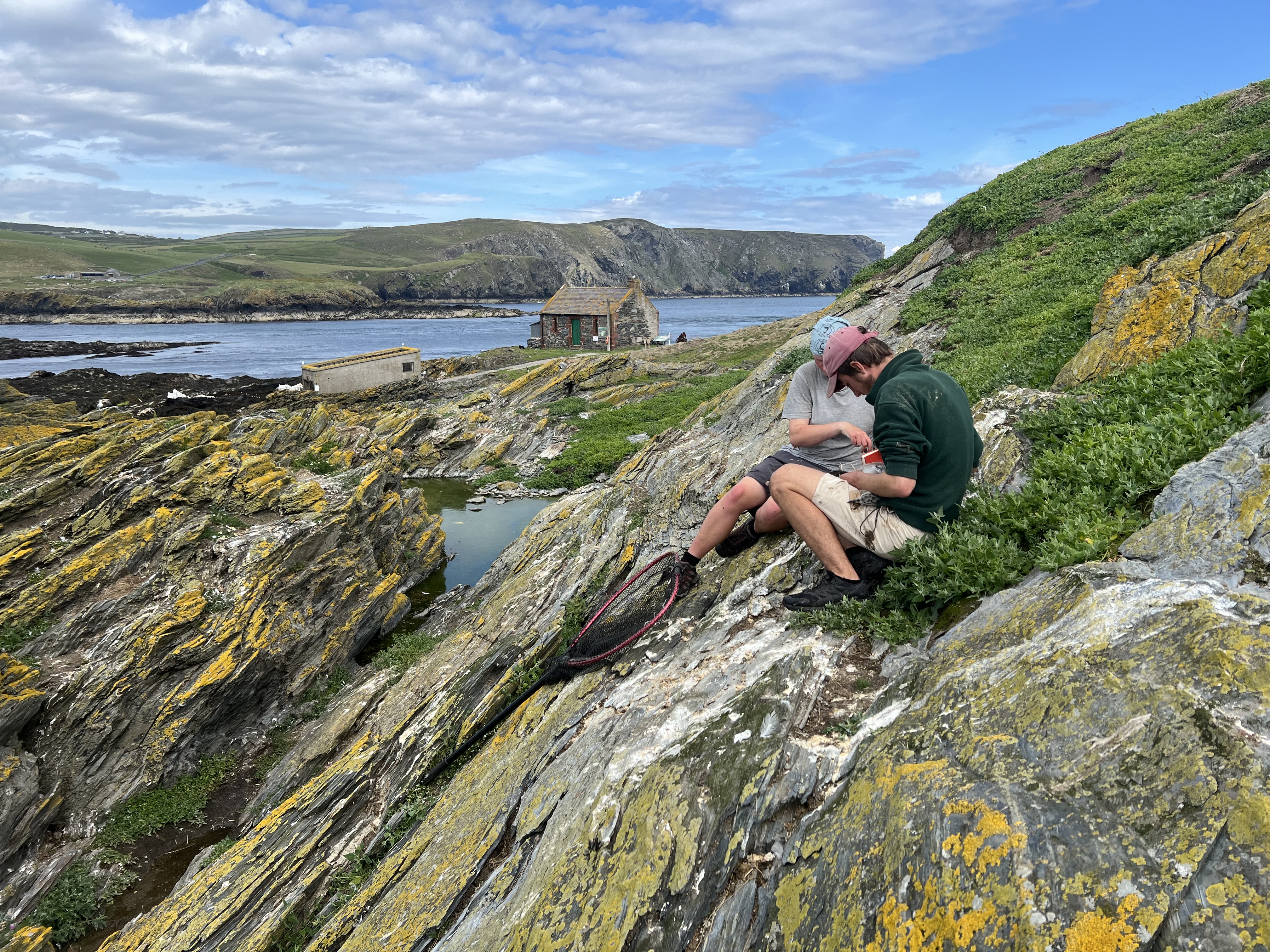
Gull chick ringing on the Calf at Cow Harbour.
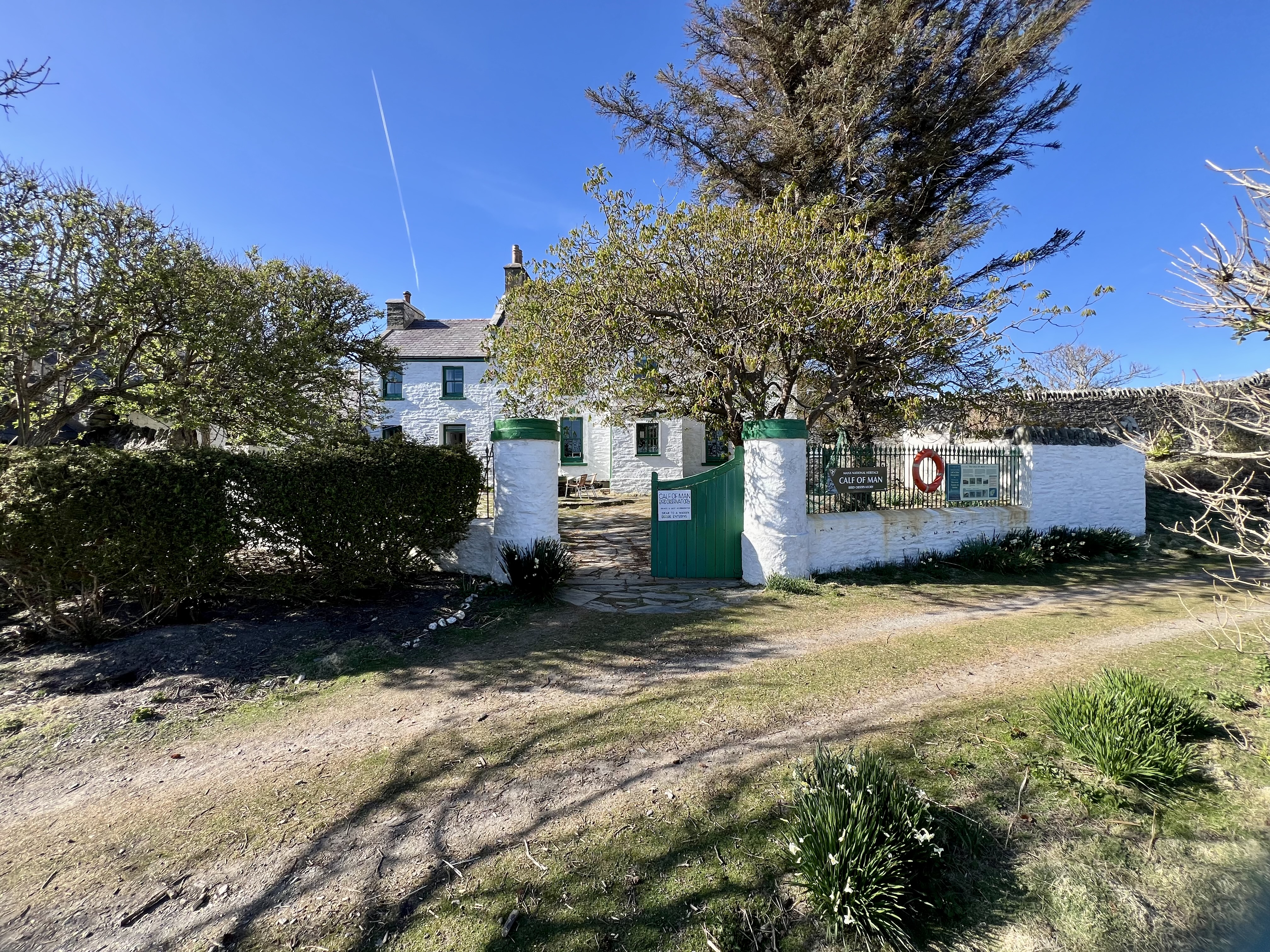
The bird observatory, where the wardens live and where guests stay in hostel-like accomodation
The highlight of the job, for Kate, is seeing other people invest in the island as much as she does. People like Pat and David, volunteers from the mainland who come over to fix the island’s walls and three lighthouses. They have been running dry stone walling courses for people so that the craft survives and they take the time to show me how it’s done. In short: slowly and painstakingly, selecting each flat rock with care and lodging it into the wall without any adhesive, relying on the layering of the different pieces to hold it in place. ‘The walling we do over here we do for free’, Pat says, before David adds: ‘Because we just love doing it.’ He points to four white rocks in one wall he has fixed, telling me there is one for each of his grandchildren.
Also in love with the island are its guests. A group arrived while I was there, to live in the basic accommodation along with the wardens. It’s ‘beautiful’ one says, who has brought their children. ‘Peaceful,’ another mother adds, clarifying ‘no phones’. I ask her children if this bothers them. It does not. They are already looking forward to playing card games and swimming in the icy Irish sea. The best part is ‘definitely the seals’ says one of the youngest boys, with a grin.
The wardens don't live here all year round as the supply boats can't reach the island with enough reliability in winter, but Dominic is sure they’d ‘all love to stay.’ He points out the Latin phrase on the front of the main entrance to the observatory: parva domus gaudium magnum. ‘That means: “Small house, great joy.”’
Lotte is Country Life's digital writer. Before joining in 2025, she was checking commas and writing news headlines for The Times and The Sunday Times as a sub-editor. She has written for The Times, New Statesman, The Fence and Spectator World. She pens Country Life Online's arts and culture interview series, Consuming Passions.
